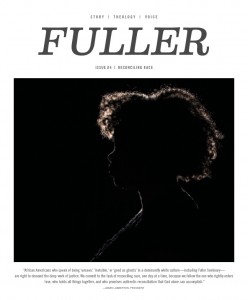
+ The Story Table takes a theme from FULLER magazine and brings it to life at everyone’s favorite conversation place: the dinner table. People who embody the theme in unique ways tell their stories around the table, and members of the community are invited to listen in. The second Story Table focused on reconciling race, and we were honored to host among our Storytellers and witnesses faculty, students, staff, alumni, deans, the executive office, and others to tell—and to witness—personal experiences around race. If you are interested in hosting your own Story Table, we’ve prepared a guide that you might find helpful. If you are interested in hosting your own Story Table, we’ve prepared a guide that you might find helpful. Download our Story Table Guide.
Guests:
Jeanelle Austin, Director of the William E. Pannell Center
Caleb Campbell, MDiv student
Clementina Chacon, Director of Operations at Centro Latino
Matt Harris, Founder of Project Impact in Los Angeles
Love Sechrest, Professor of New Testament Studies
Steve Yamaguchi, Dean of Students
Jude Tiersma Watson, Professor of Urban Mission
Meggie Anderson, Story Table Coordinator: First, here is Caleb Campbell, and he is a student here at Fuller. What year are you here?
Caleb Campbell: Second year.
Meggie: Second year student. This is Clementina Chacon, and she is the Director of Operations at the Centro Latino. Jude Tiersma Watson is a professor of Urban Mission in the School of Intercultural Studies.
Steve Yamaguchi is our Dean of Students, and this is his second year here at Fuller as well. Matt Harris is the founder of Project Impact in Los Angeles, and he is also an alumnus of Fuller—he got his Doctorate of Ministry here.
Jeanelle Austin, a recent graduate, is the director of the William E. Pannell Center for African American Church Studies, and Love Sechrest is a professor of New Testament Studies in our School of Theology. We’d like to open with a word of prayer. Everyone may join.
Oh God, we are all together here about to embark on a great adventure. I pray your blessing upon this evening, upon everyone sitting around this table. God, you have known them and called them by name. We are here to witness stories that are dealing with identity—very sensitive and tender stories of identity, God.
I pray that we would be active listeners to these honorable testimonies. I pray for Lauralee, as she moderates this conversation, and I pray that all of us would be open to the idea that storytelling is a sacred act of participating in your ongoing story of redeeming your creation, God. Thank you that we get to join in on that this evening, and through these stories I pray we would see your image more clearly, that everyone sitting around this table might know you more deeply, Lord. In your name we pray. Amen.
Congregation: Amen.
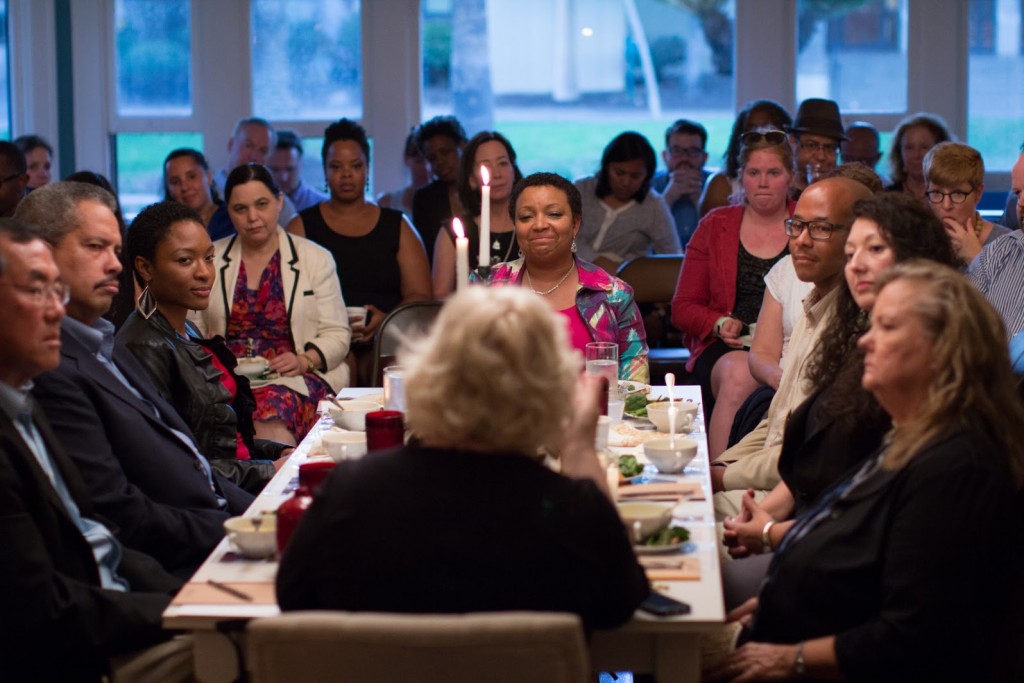
Lauralee Farrer, Chief Creative at Fuller and Story Table Moderator: My dears, it’s a pleasure to sit here and to see all your faces. I knew these faces would be here, but I didn’t know what it would feel like to sit here and be looking straight at you from this vantage point. That’s lovely. As far as your faces are giving me good vibes, otherwise look away!
[laughter]
Lauralee: This is such a weighty undertaking if I think about coming to this table as an “issue” that we’re addressing. Without seeing you in your flesh and blood, with your faces here in front of me, all day and many days before now I have felt burdened with “how on earth are we going to have one such conversation and not a thousand? How are we going to choose eight around a table instead of a thousand around a table?”
Now this feels perfectly natural: of course Clementina, of course Jude, of course Jeanelle. Of course even Matt—whom I only met moments ago. This feels as it should—embodied, real, and possible for us to be here for these reasons, because we are here together.
Love and I were talking a few minutes ago about story, and the difference between story and all the other ways that we communicate about this subject and subjects that matter to us. We have chapel services. We have panels. We have conferences. We have classrooms.
What sometimes gets missed in those moments are the stories that end up communicating straight to a different part of us, that live with us. Again, to use you, Love, as an example, I remember when you were on a panel, and I heard everything that you said on the panel, and it all went here [points to her head]. Then you told a story at the end of that. It’s your story whether you decide to tell or not, but the story went somewhere else. It went into my heart.
Every time I think about the story that you told, it affects my whole person because I love you. [tears up] I’m never going to make it this through this! That affects me because you were affected. Love was affected. Thank you for sharing so vulnerably.
Also, it serves as an example of what story can do at the magazine. I hope at Fuller in general, we consider stories, your stories at the table, all of those in the room, and all the ones that end up in our magazines and elsewhere as sacred trusts. Aren’t they?
Lauralee: This is our second story table. The table we are sitting at is a table that belongs in Victoria’s office so we hauled this over here. Lindsey and Meggie went around campus and cut flowers from…oops…should I admit we did this?
[laughter]
Lindsey: It’s too late now.
Lauralee: They went somewhere and cut flowers for our decor.
[laughter]

Lauralee: I feel it’s lovely that so much of what’s on the table, and what’s in the space here, is from our homes, from our yard. Many of us, I’m sure that you will relate to this, recognize that The Catalyst [building] itself is a container for stories. There are a lot of stories here in this space.
We try to bring artifacts from our homes because they, like these walls, can contain a little bit of story. How much more so the persons around the table? Do you mind if I pick on you first, Jude? When I asked if you would be willing to join us at the story table, you said that story was something that you do in your classes all the time, something that you were really comfortable with. Can you talk about that a little bit and where does that come from, and why and maybe a story of your own that fits that?
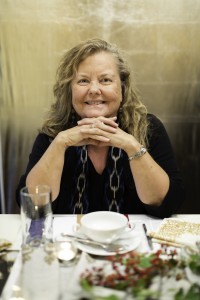
Jude Tiersma Watson: I’ve come to understand, listening to people and being involved for years living in Central L.A., that stories are who people are. Our story of our life is our life. When we talk about a topic we take this little slice, but story covers life, and each story is a part of God’s story.
I’ve been involved with different people in my context in L.A.—all my neighbors are Latino immigrants. It’s about sharing our lives together, sharing my past and their past.
I was learning Spanish and it was great. I had this friend named Josefina, and she was from El Salvador and she loved to tell stories. She told me about why she left El Salvador. Then I started sharing about how I was an immigrant from The Netherlands, and how I started school and English was my third language, and how I didn’t speak through all of kindergarten, because I didn’t know any English.
She looked at me and she said, “You’re like our kids.” Inside I’m like, “Oh no, I’m not! Because I’m white, I have been way more privileged.” [laughs] For me, I would have never made that connection because I see the difference. For her, though, that story of mine connected me with her story, and there was a connection that bonded us in a way that that nothing else did.
Lauralee: Imagine her giving that gift of a sentence to you: “You’re like our children.” That’s a pretty intense thing to say. Maybe we can collect those little mosaic images to build a stronger or more vibrant image of God? When Jude told that, did that spark anything in anybody? Caleb, you’re nodding your head. You learn not to do that at the table unless you want to get called on!
[laughter]
Watch Jude tell her story
Lauralee: Steve, can I prevail on you to tell the story about what happened with your parents this last week. . .
Steve Yamaguchi: Oh, my goodness.
Lauralee: . . . as a result of the magazine?
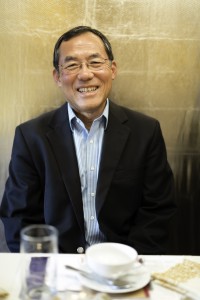
Steve: Oh, yes. I visited my parents for dinner on Saturday, and after dinner we were sitting around. My dad said, “I like the article in the magazine.” He had read my very brief statement in the magazine article about my experience with recovery from alcoholism through AA and 12 Steps and what that means to me.
He said, “I liked that,” and I said, “Oh, well great!” We’d never really talked in detail about my story. He knew the broad brushstrokes, but we ended up having a conversation for about an hour and a half, and I told my whole story with all the detail.
We’d never had this conversation before. And by the end of the evening my parents, they said, “We’re very proud of you.” It was the most profound conversation I’ve ever had with my parents: we talked about addiction, recovery, life, death, faith, in ways we never had. While we were having the conversation, I was thinking about Lauralee.
Lauralee: [teasing] This is the part I couldn’t wait for you to get to!
[laughter]
Steve: I was very conscious about that and I thought, “What a gift this magazine is, that it allowed a forum for a story like mine, and then triggered this conversation that was the gift of a lifetime.” So, this week, I’ve had a very profound experience of the power of story.
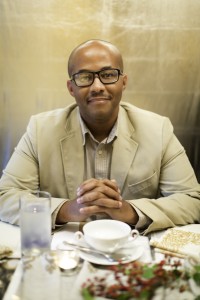
Caleb Campbell: I was thinking, as I was reflecting on the story of my life, one of the significant things that happened to me as a child. My mother was working a lot with me, and helping me, and educating me even before I got to school. I was able to read at age four before starting school.
One of my cousins, he was so deeply impressed with that that every time he saw me he would make a big to‑do about it. Point people towards me and tell me, “Here, read this!” Or, “Watch him read this.”
[laughter]
Lauralee: “Watch him! Watch him read this!” That’s adorable. Can you read something for us now?
Caleb: [laughter] What it gave to me was, it helped me to realize that was my special thing—reading and learning—and it pushed me in a direction where I always wanted to strive to be as best as I could in school. That gave me the impetus to be at the top of the class, and strive for honor roll and other things.
As you were talking about childhood experiences, I thought how crucial it is to have that type of knowledge of oneself, of your gifts, of what makes you special, why you’re important, why you matter. How important that is for the development of a child!
Unfortunately, there are those among us who don’t get to have that in their childhood, and it impacts the course of their entire lives.
Lauralee: How old was that cousin?
Caleb: He was an adult.
Lauralee: Did you look up to him?
Caleb: Yes.
Lauralee: No doubt. It’s not a big leap to imagine you at four, and now all these years later look where you are. Right? Lovely, on both counts, for the four‑year‑old, and the adult who called that out in you. [to Matt Harris] You’re smiling.
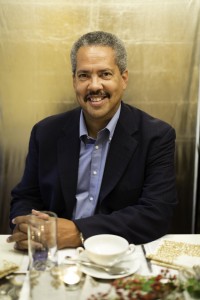
Matt Harris: [emotional] I’m done!
[laughter]
Matt: Am I nodding my head?
[crosstalk]
Lauralee: That’s all it takes, Matt—smiling. You’re not actually saying anything out loud, you know that, right Matt?
Matt: My story is from here forward, that really learning and appreciating a support community, and particularly from this fellow whose face is on this placemat here in front of me, Bill Pannell.
Lauralee: We put you at that very seat for a reason.
Matt: Bill was my dissertation chair. I had to get the permission of his wife, Hazel, in order for that to happen which was a great experience. Bill taught me the significance of having courageous conversation, particularly when it comes to race, and knowing that it’s something we’ve got to be able to deal with, and it’s the 600 pound gorilla that sits in the middle of the room. It makes folks uncomfortable.
One of my challenges when I came here to Fuller, was that it was uncomfortable for me as an African American, because I looked for the support systems that attracted me here. Once I got here, I found support with Bill, and the larger community was sympathetic to the plight that I was sensing within the inner city. But when it came to my actually taking the coursework, I was required to do internships at local churches, and they gave a list of churches: all the churches were white churches.
I asked my professor, “Now hold on. I’m paying my money just like everybody else. Why aren’t there inner city African American churches listed here?” The response was, “Well, that’s because the people that were coming here didn’t want to learn from an African American experience.”
[audible groans]
When I talked to Bill I said, “Bill, we need to have some courageous conversation about that.” That’s when I changed my whole discipline of church growth. That’s when I changed learning how to grow my church like white folks would grow their church to developing a model of ministry that said, “Let’s develop the capacity to reach people that live around us, and let’s not be afraid of having that discussion. Let’s not be afraid of encouraging others to have that discussion, because you don’t have to change who you are in order to accommodate your education experience.”
Bill said, “Matt, be yourself even if you’re by yourself and you have very little support around you.”
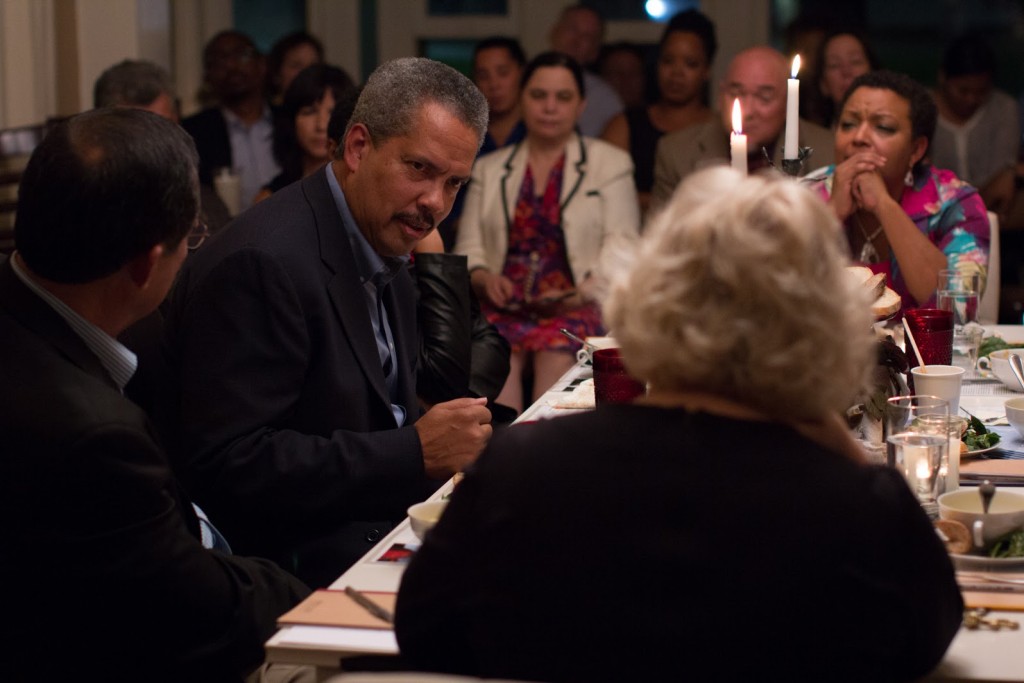
Lauralee: Can I say thank you, first of all, for telling a story about courageous conversation, and being courageous while you’re telling the story. Right? Well done, you, and well done, Bill Pannell.
If we can for a moment remember Bill, and what’s going on in his life right now with the loss this week of his beloved son Phil. If Bill comes across your mind, whisper a prayer for him and Hazel and Luann and the children.

Love Sechrest: Could I jump in?
Lauralee: I was getting ready to throw my fork at you, so speak.
Love: Caleb’s story resonated with the affirmation on intellect at a young age. Wow, how powerful! First I should say honestly, there are stories I will edit because this process isn’t safe actually for me. But here is a safe story. I’m over 50 now, and being smart has always been important to me. I love learning, I’m a life learner. People, especially in the African American community, say, “You still in school? How many degrees are you going to get?” There’s this: “Go get a job!”
[laughter]
Lauralee: As if learning is a headache that’s supposed to go away.
[laughter]
Love: I remember well. It wasn’t that I lacked affirmation from the people inside my family. I don’t actually know what it was, but I was starved for that.
As a matter of fact, truth be told, I did not know I was smart until I was over 40. I was in the top PhD program in New Testament in the world at the time, and becoming one of the top students in that program. Here is the thought that occurred to me: “You know, the evidence is actually mounting.”
[laughter]
Lauralee: You’re not going to be able to deny this one! But it’s risky to admit that, I mean to see that? Am I right?
Love: Yeah, it is! People were challenging me as professor of New Testament in the classroom all the time—”presumed incompetent as an African American woman”: that’s the truth of the matter. I don’t remember all the things that went into starving me, because I know I got encouragement at home. Maybe some pattern that is now lost to me—in God’s mercy? I remember that with every teacher I had, there was always a moment where they discovered I had a brain, and I know the moment with every one of those teachers. I know the moment.
I’ll never forget—there was a very well-known professor of New Testament that I had in my doctorate program. It was the day after he read my paper and all of a sudden there was interest in who I was, and where I was going, and what I wanted to write. I know the look! I remember that day. I remember, “Yeah, I’ve seen that look. I know that look.”
I think with every one of my teachers that I was not presumed smart, but each time there was one day when apparently I proved it well enough.
Lauralee: An epiphany.
Love: Yeah. Was it the surprised looks that I got over and over as a kid? I don’t know, but I was starved and I was over 40 before I realized I had a brain.
Lauralee: Let me ask you this, did the surprises beat you down? It could go either way. Did it beat you down or did it strengthen you?
Love: It’s a burden to have to prove yourself all of the time.
[strong assent from the crowd]
Love: It’s a burden. [laughs] Poor Mignon Jacobs, I’ve got a story about her and she’s not here to defend herself! Here we go, Mignon is Afro‑Caribbean, which is very different than African‑American. She was not raised with a lot of the dysfunction that we have here in this country. I’m sure they have their own dysfunction, but she’s different than I am. Especially on this thing about being smart. I remember when I first met her, I would be surprised at things she would admit to. She tells this story about how she was delivering a paper in Germany.
Lauralee: The way one does.
Love: Right, this is Mignon Jacobs. She is the man!
[laughter]
Love: She’s amazing! She’s giving this paper in Germany somewhere, and someone challenges her, stands up and proceeds to hold forth on some key book that she should have read, and how could she do a paper on this topic, etc. Mignon says, “I’m sorry. I haven’t read that book, what’s in it?” Just like that. I’m sitting here thinking I could never have admitted that. [snaps her fingers with ease] Because for her, it’s just a book. I haven’t read it. No one’s read everything.
Lauralee: It’s just a book.
Love: It’s just a book. For me it’s, “oh my word, I’ve got to cover that flank,” because people are going to think. . .
Lauralee: Yeah, “that imposter.”
Love: Yeah! I’m spending energy doing that while she’s saying, “It’s just a book.”
Lauralee: You all heard that when you [Love] said, “it gets exhausting to prove yourself.” You heard the room.
Love: Yeah, mm‑hmm.
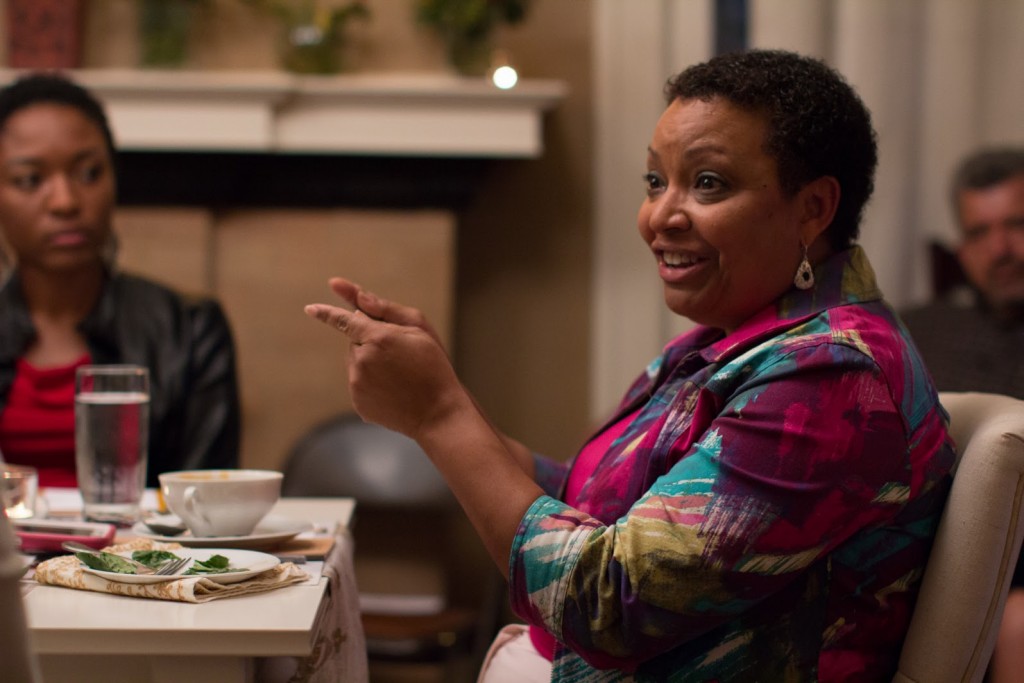
Lauralee: [indicates Jeanelle by pointing] Jeanelle. Sorry, it’s not nice to point.
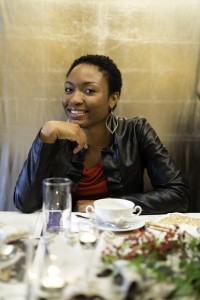
Jeanelle Austin: I heard that a lot time ago, but I’m going to take the floor anyway.
[laughter]
Jeanelle: What was your last name, sir?
Matt: Matt Harris.
Jeanelle: Can I call you Dr. Harris?
Matt: Call me Matt, please.
Jeanelle: My goodness, this is so hard for me. Your story resonated with me about changing and transforming institutions. Since I was young, it’s been my personal goal. I tell people from time to time that I was the girl in high school that was in the principal’s office, telling him how he needed to run the school better.
[laughter]
Lauralee: [sarcastic] I can’t imagine it!
Jeanelle: Right!
[laughter]
Jeanelle: Part of it was, I grew up in a bi‑cultural context where I went to church in a black community and lived in a black home, but I went to school in predominantly white Christian schools, and that was hard.
I grew up in a big family. I have three siblings above me, and three siblings below me. There was a point where I made a decision and I said, “I can’t let my younger siblings go through what I went through.”
[emotional]
I’m now regretting that I put mascara on right now.
[laughter]
Lauralee: I’ll give you the signal if it starts to run.
Jeanelle: OK. Thank you. It was hard. I didn’t tell my siblings what I went through. I wish I had. I found out later that they went through the exact same struggles in these schools. Because no one cared to know how our culture was different, how our home was different. They didn’t care to know about our struggles.
I knew my siblings were going to go to the same grade school and high school that I went to, but I didn’t know if they would go to the same college. My sister right under me, she actually went to Seattle. She’s like, “I just got to get away from these white people.” That was her reasoning—to go to Seattle to get away from the white people. She didn’t know Seattle was white!
[laughter]
Lauralee: “I’m going to get away from all these white people, and go to some little town in Indiana.”
[laughter]
Jeanelle: She loves Seattle though. She’s part of the community. She really struggled and she said to herself, “I’m going to major in accounting because I don’t want to be poor. I don’t want to have to worry about not having the things my friends have.”
Or, “My friend’s parents give them a car at 16 and I’m still taking the bus.” Those are the kind of socioeconomic differences that they really struggled with. If you’re going on a missions trip and you’re the only black person—you get treated differently. You get treated differently by the locals, and you get treated differently by your teammates, and you’re a kid. Your brain can’t comprehend everything that’s happening. At some point, even when I was at college, I made a decision that I had to make things better because I have three younger siblings who are coming after me.
Then at some point it flipped and I said, “I have to make it better because there are generations of young black kids coming after me. It’s about being able to make these institutions a better place for any young or old black person who wants to study here, and feel like they belong.”
Lauralee: It’s unfortunate that about the time that you realized you’re through with this, and you’re not going to prove yourself anymore, and that you’re exhausted by that—it’s about that time that you realize that you’ve got all kinds of eyes on you, younger people saying, “What’s she going to say in this situation? What’s she going to do? Is she going to quit? Is she going to leave it for us to figure out?” Because then you can’t give up. It’s too late.
Jeanelle: Right.
Lauralee: In those stories about your siblings, what made you tear up?
Jeanelle: I love my family. We’re so close.
Lauralee: Tell me a story. Tell me one example of something that happened that made you think, “It is no longer within the possibility for me to walk away from making change.”
Jeanelle: I don’t think I can tell you a story that was the turning point. Because my family, we grew up going to a black church and white schools. All the kids in our church went to black schools and public school, and all the kids in our schools, they all had white communities. We were the only ones that we knew of that had this bi‑cultural world. We became each others’ best friends. When you are each others’ best friend, you have each others’ back. We were always taught to care for each other. We look out for each other. We look out for each other in the parks. We look out for each other wherever we go, when we go to school. We worked in the same offices when we grew up as kids.
We were always with each other. We took the bus together everywhere. It was something built into the fabric of our family, where we cared for each other. For me, because I knew it hurt so bad, going through these schools, there was something in me that said, “I don’t want my siblings to go through what I went through.”
The one under me [gesturing under her arm]—she’s about four and a half years apart. We have the older and the younger. . .
Lauralee: I like it, by the way, that you did this [as if cupping her under a wing] when you said “the younger one,” like she’s right there under your wing.
Jeanelle: She’s right there, yeah. That’s because I probably her in a headlock at some point.
[laughter]
Lauralee: Just let me have my tender moment.
[laughter]
Jeanelle: It’s how my parents cultivated family in our home, and we needed to look out for blood. Blood runs thick. My grandparents instilled that into us. You always look after family. It wasn’t an option, even when we were in the schools together.
My mom, she volunteered a lot in our schools, or she found offices and positions in our schools, because she always wanted to make sure that we were okay. When we got fed up in the middle of class, I could walk out of class and go to my mom’s office and sit there, until I could get myself back together and go to class.
Lauralee: God bless your mother.
Jeanelle: And I needed that.
Lauralee: She knew that.
Jeanelle: Yeah.
Lauralee: Wow. God bless her.
Jeanelle: Yeah. I didn’t have the foresight to see that, but she knew because her mother had told her, “I don’t like the idea of you sending these kids to these white schools, and they’re not going to get their ethnic education, and their cultural education.”
My parents knew the sacrifice that they were making, and so they were trying to make sure they looked out for us.
Lauralee: To make up for it.
Jeanelle: We had to look out for each other too.
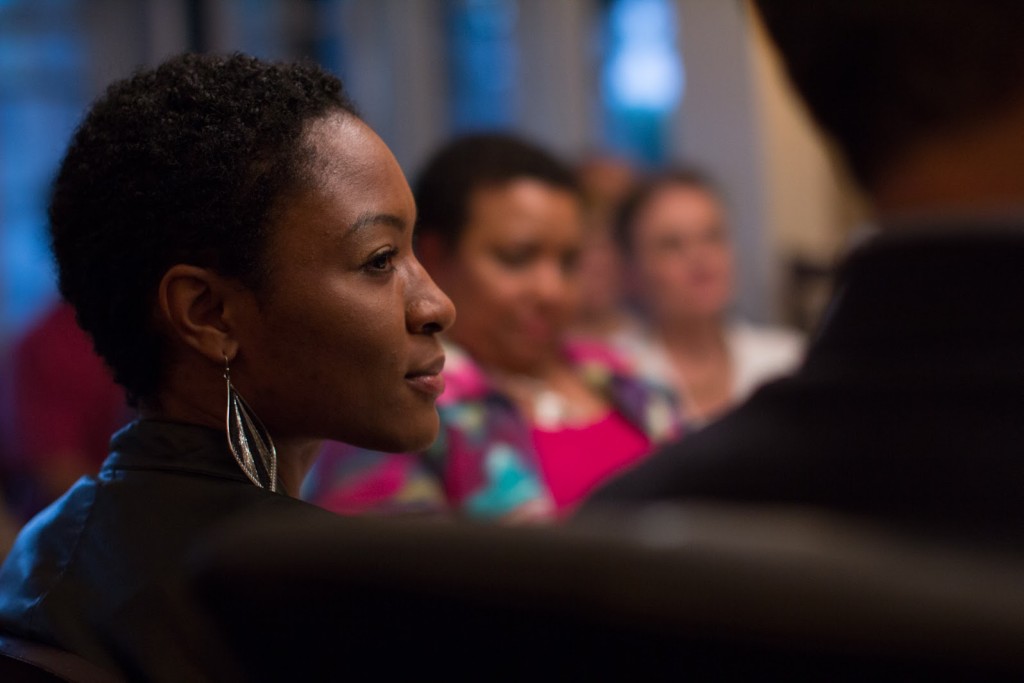
Lauralee: Matt, you had something you were going to say a minute ago?
Matt: I’m listening to your stories, and I couldn’t help but . . . I’m going to be a little transparent. I’m 60 years old . . .
Lauralee: Baby!
[laughter]
Matt: I was born in 1955. My children represent the first generation of kids that were born into this world with all their rights.
Lauralee: Wow.
Matt: When I was born, in 1955, the Civil Right and the Voting Rights Act had not been passed. I remember growing up in a time where I saw the signs, and I remember my parents being disrespected. One particular instance, since we’re around the table, [looks to the audience] can I be real with . . .
Lauralee: You don’t need to look at anybody over there. I’m right here.
[laughter]
Lauralee: You have permission.
Matt: We were downtown, and my father had been pulled over by a policeman. This was in the ’60s. I was about nine years old. My father said, “Excuse me officer. Is there a problem?”
The officer said, “Shut the h*** up, n*****, before I throw your a** in jail.” I’m a nine‑year‑old person, and every curse word that I could think of was going through my little mind.
I’m thinking to myself, “What in the world would make this man, the person that I was taught to respect as an officer, what would make him say that to somebody that has done nothing but good in our home, who has provided? And if he knew my father, he wouldn’t call him those awful names.”
As a little kid, there was some stuff inside of me that was put there. When I heard you and others share around the table, I thought part of the challenge of growing up is knowing how to navigate through the pejorative assumptions.
That becomes a language and a skillset that you have to learn with a smile on your face, that you genuinely have to learn, because if you don’t, you walk around as the angry black man.
Lauralee: And then you’re made into something that you don’t want to be as a result.
Matt: Yes. My story is my father’s story, which was, out of that whole situation he taught me how to love those that spitefully treat you.
Caleb: Amen.
Matt: . . . and he modelled that. I saw my father practice something that I struggled with, and even to this day I still struggle with, but I have at least some mentors that I can look at and say, “If he could do it, then maybe there is some hope for me to navigate through this experience myself.”
What we find is that, by sharing those stories, and encouraging other with that story, that we become a better community.
Lauralee: Can we go off‑story for a second, to ask a quick question? Remember how you said that your mother nurtured that sense of family in the children, so they knew to protect each other. I’m thinking about you having said that, and at the same time saying that you have a desire to affect institutions and make them better places.
Think on this: Is it possible for us to nurture institutions? Can we nurture something together so that I feel, in some way, about you, the way your mother taught your brothers and sisters to feel about each other? Do you know what I mean?
Can we nurture, I don’t know, maybe not family, that’s maybe a little too loaded, but can we have that thought in our minds as we go on?
Okay, since I pointed at you and you nodded [toward Clementina] . . .
[laughter]
Lauralee: . . . what are you thinking, my friend?
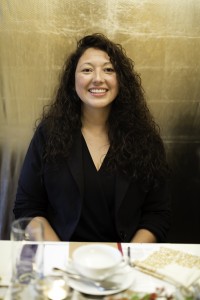 Clementina Chac ón: It’s funny, I had this conversation with our new director Oscar Garcia‑Johnson, about how we can better serve students here at Fuller. One thing that I’ve noticed in Centro Latino, our retention is very high. People have asked, “Well, how do you do that?”
Clementina Chac ón: It’s funny, I had this conversation with our new director Oscar Garcia‑Johnson, about how we can better serve students here at Fuller. One thing that I’ve noticed in Centro Latino, our retention is very high. People have asked, “Well, how do you do that?”
Lauralee: Do tell! Irene [VP of Communications, Marketing and Admissions] . . .
[laughter]
. . . are you listening?
[laughter]
Irene: We’re listening!
Clementina: The answer is so simple. It’s having relationship with students, because at the end of the day, the administration should complement the vision. It shouldn’t be the other way around.
Oftentimes, when I’ve felt the struggle that, “Hey, we have students that need scholarships, we have students that do not have documentation, students that are challenged for whatever reasons.” If we try to address it in making the vision to complement the administration and faculty, it will not work.
We will have done Fuller for a hundred years, and then it ends. If we do it the other way around, that’s where we start to see a difference, and that’s when people start to come back.
A part of that I have to credit to my culture. Because, exactly what you [Jeanelle] were saying is, when you were saying “family,” I think of my family, the way that I was raised. Which was, in a way very clannish. You stay inside. Why would you ever think of leaving? It doesn’t matter how dysfunctional it is . . .
Lauralee: Who is better than we are?
[laughter]
Clementina: Yeah. Because I grew up in a very dysfunctional family, but yet, out of all of my 32 cousins—that’s first cousins!—me and one other cousin left the state. Everybody gave us the hardest time: “Why are you leaving? You have everything you need here!”
Number one, it was trying to get people to understand where I was coming from. It took a while for my mom to accept: “Mom, I’m not going to be at home until I’m married.” Because once I was 30 and still not married, she’s like, “Well, it’s OK. You can stay here until you’re married. Or until whatever.”
[laughter]
Lauralee: It’s looking good to her all of a sudden!
[laughter]
Clementina: I’m like, “No. I have other desires and other dreams.” For my older cousins, they didn’t understand and they thought I was being very disrespectful by leaving. “You’re not obeying your parents. You should stay at home. There are things you could do here. You could find a job. If you want to study, do this.”
Also, I should mention that I’m only #4 who graduated from high school, and the first one to graduate with a master’s degree. Out of all of those cousins.
Lauralee: Congratulations.
Clementina: Thank you. By the grace of God.
Lauralee: Yes.
Clementina: I remember having this younger generation looking at me and not saying a word, but simply watching, to see what I’m going to do. How it ties into conversations and stories makes a difference. Because I believe that, number one, we serve a God that is relational. We’re talking about theology now. Who is God? God is one that desires to be in relationship with us. A God that desires to touch us, to fill us, to move us, to allow us to see different perspectives that we’ve not seen.
How does that happen? It only happens when we’re able to share and be vulnerable. Because, if I have a struggle and I’m holding onto it, then it’s mine, and I’m not in relationship with God in that area.
I feel that it’s the same when it comes to this level, human beings, how we relate to each other. I feel that, if I’m able to have relationship with you, and give you a part of myself, most people will come up to the plate.
Lauralee: People want that, don’t they?
[strong audience assent]
Lauralee: Whenever I hear you tell stories about your large family or your 32 first cousins, I don’t think, “Uh, what a pain it must be to buy all those Christmas gifts!” I think that sounds fantastic. I see everyone nodding as if to say, “Yeah, that’s how it is.” That sounds wonderful. I feel that most people want to know that.
Clementina: We’re a people that, we watch TV all the time, why? Because we want to see what’s happening in other people’s lives. How they live.
[crosstalk]
Lauralee: And we’re made for community.
Clementina: Right we’re made for it.

Lauralee: [to Jude] You were nodding a second ago . . .
Jude: Going back to story, stories are part of relationship. It’s very interwoven, right? It’s not about abstract truths in those things that we share.
Lauralee: It’s embodied.
Jude: . . . It’s embodied. Exactly. When we share our lives we share our stories. Can I share something?
Lauralee: Yes, please.
Jude: On the issue of reconciling race. Sometimes I hear people say—because I’m all about the relationship and the city and getting to know each other—people say, “Well it can’t be just about relationship.” I agree, it can’t just be about relationship, but it has to be about relationship at the core.
I’m married to John, who is sitting in the back somewhere with a hat on.
Lauralee: Right there.
Jude: I thought I was pretty open . . .
Lauralee: Well done, John, by the way. Good move!
[laughter]
Jude: I had a degree in cross‑cultural studies, I’d lived in this neighborhood, and done mission stuff, and when John and I were engaged he said to me, “Do you know what it means, that you’re going to marry me?” I was like, “What are you talking about?” [laughs]
He says, “Because I’m black. Do you know what that means? Do you know what it’ll cost you?” I was so naïve. I didn’t really know. I don’t blame myself for being naïve, because I’m a product of my generation. Our society doesn’t teach us those things.
For me, being married to John, all of a sudden his story, well, “the two shall become one.” His story became my story. I had a moment when we were engaged, and I had already met John’s dad, Big John. I was at the library in Los Angeles where there was a photo gallery.
At that time, the gallery was filled with pictures of lynchings in the Jim Crow South. It’s not that I wasn’t interested, I felt really overwhelmed, so I started to walk by, and literally, it’s like God stopped me dead in my tracks.
I couldn’t move and God said, “You’re going in.” I was like, “Okay.” I went in, and I only looked at one picture, the very first one. I looked at that photo [of a man lynched], and the man in that photo was the spitting image of Big John. [emotional]
I’ll speak as a white person, a lot of us, we care about those folks. There’s so many things we do, Americans love to help other people and, we think we’re compassionate, but it’s so often about “the other,” helping “the other.”
In that moment I saw the truth. I knew in my head about Jesus breaking the dividing walls and us being one in Christ, but all of a sudden it wasn’t that my heart broke because of what happened to those folks. That happened to my people, somehow, because I was going to marry John. I realized, “Oh! That’s what the Bible . . . Oh! That’s the gospel, isn’t it?” It’s the whole point! It’s not like we can have compassion for what happened to whatever other group it is in the world. It’s us. When one part of the body hurts, we all hurt, and when one part has joy we all have joy. That came home to me in a gut way, and it’s because suddenly we shared the same story. It’s because the stories of our lives became interwoven.
[crosstalk]
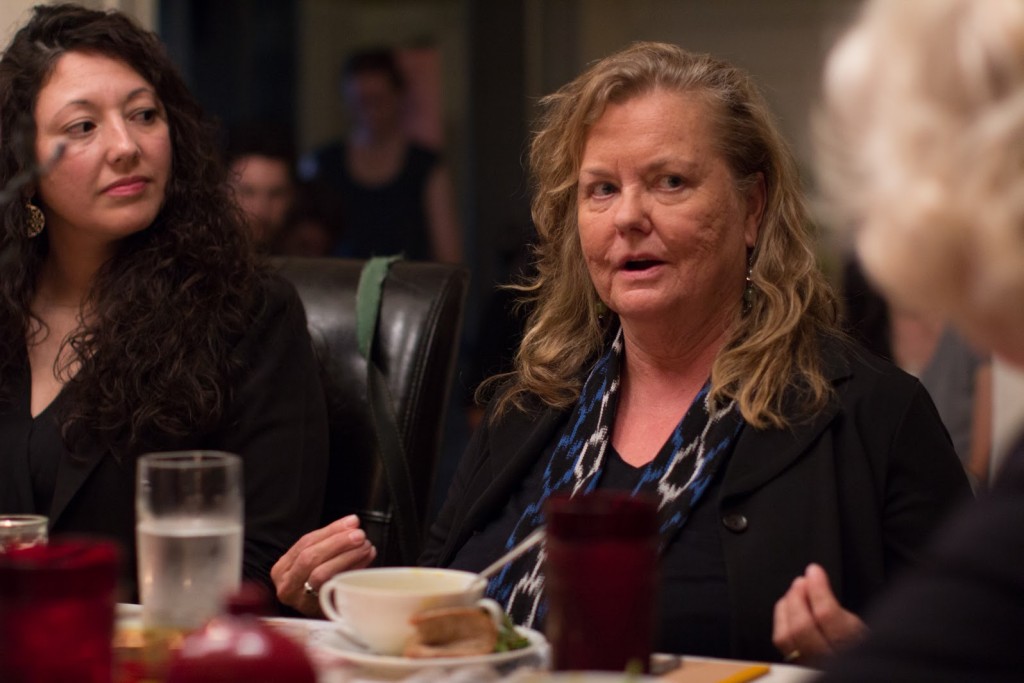
Lauralee: Steve, I was thinking about you when Jeanelle was talking about her experience growing up. You want to say something about that?
Steve: Yeah, I appreciated Jeanelle’s story also, and her story also touched me. It reminds me of experience in my childhood where my story was not known by people, and so I felt utterly lost.
Let me explain that. I was born and reared in a community that was a very tightly Japanese American community. It’s in South L.A., or, at the time the phone book said “South Central,” on Crenshaw, near the Coliseum, near Exposition.
It was a very tight‑knit community created by my parents and their parents after World War II, after coming out of the concentration camps. For safety—and because realtors didn’t sell houses to Japanese people anywhere else—these pockets were created in Southern California, and it was very intensely Japanese American.
My public school was about 90 percent Japanese American kids. I went to a Japanese American Methodist church, near the USC Campus. We had a regular milkman, and a Helms Bakery truck, and a tofu man. Who delivered tofu and meatballs and sashimi quality fish . . .
Lauralee: the Helms Bakery truck came by our place, but the tofu guy never did.
Steve: Tofu man didn’t come to your neighborhood?
[laughter]
There was such a market in this little place, it sustained the tofu man. I grew up on top of the world. My parents, in the post war years, had created this cocoon where I was the majority kid. I’m very grateful for that, because it gave me a firsthand experience of the sin of bullying, and we Japanese American kids ran the school. We bullied the other kids. The minority was this little mix of a few Chinese, Blacks, and Jews in the school. We would taunt and torment them.
I learned how to torment Chinese kids by watching TV because the only Chinese guys were pretty much the laundry men on the cowboy shows. The white cowboys’ kids would taunt the Chinese kids by pulling their eyes back and chasing them around.
We, Japanese American kids, would pull our eyes back and taunt the Chinese kids, because that’s how we learned that you taunt Chinese kids. I was the product of a world where I ruled. I was tall so I was the center of the basketball team, and I loved that world. Until, my family moved to Orange County in 1965.
[big groan from the audience]
Lauralee: Wow! Did you feel the room then?
[laughter]
Lauralee: Everybody said, “Oh no! What’s going to happen now?”
[laughter]
Lauralee: All drama is made of tension. This just got good.
Steve: Thank you for framing that.
Lauralee: You’re welcome.
[laughter]
Steve: We moved to a town called Tustin, and it was a hotbed of the John Birch Society. The John Birch Society was very flamingly out. The editor of the Tustin News was a Bircher who lived up the street from us. They openly led the school board.
I went from being a bully on top of the world who had everything he ever wanted, to becoming the “dirty Jap.” Those were the years before Japanese technology had developed so much, so “made in Japan” meant inferior, imitation, cheap, and sure to break quickly.
I was “made in Japan.” I was the Jap. I was physically, verbally, assaulted, and completely alienated from the world around me. I was the only Japanese American kid in the upper grades in my school. My parents, having moved us there, had this advice for me: “Don’t stick out.”
[laughter]
Lauralee: Poor Steve! How’d that go?
[laughter]
Steve: In fairness to them, there is a classic Japanese proverb, [Japanese], Deru kugi wa utareru, which means “The nail that sticks out will be pounded down.”
Lauralee: Wow, let’s pause on that for a second.
[groans of assent]
Steve: When you think about the conformity that’s typical of Japanese society and culture. The warning to me was, “Don’t stick out, and don’t get in trouble. Because if you’re with a bunch of boys and you’re making trouble, and they see you running away, the only one they’re going to remember is you. Because you’re different.”
I lived in the terror of being caught. The other thing was that my whole story of my whole life in L.A. had been filled with delight, and fighting, and rough‑necking with friends. Suddenly it was very uncivilized in this new world, and I couldn’t talk about it.
These new friends had completely different hobbies. There were no sidewalks. There were no street lights in that community. Kids walked around barefoot. They surfed. They went to this place called Mammoth and skied in the winter. I had no idea what skiing was in the winter. I was very much out of it. My story had no one to resonate with. And as for my former life, I wondered, “was it real?” You’re desperately trying to fit into a world that’s impossible to fit into.
Lauralee: How old were you when you moved?
Steve: 13.
Lauralee: Gosh, Steve. At 13, you have no consciousness that you’re living a completely different life than anyone else is. How do you process all of that? You think this is the way the world is when you’re young like that. That seems very hard. Very hard.
[quiet pause.]
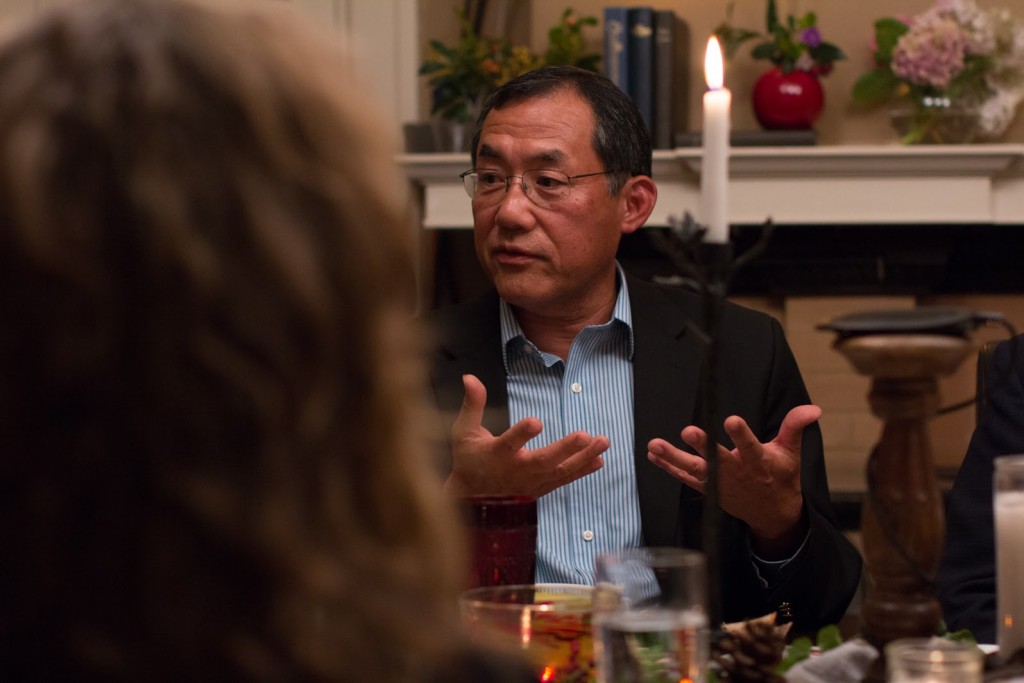
Lauralee: I notice no one is making eye‑contact with me.
[laughter]
Lauralee: Nobody’s nodding around the table. Everyone is going like this [head bowed].
Jeanelle: Gosh, look at that.
[laughter]
I’m thinking about your question, “Can institutions be nurtured?” I do believe that institutions can change, because institutions are social constructs of society. If we can create something, we can deconstruct that and rebuild something else. At the same time, institutions are not human beings in which there’s going to be a relationship there. I feel like the term “nurturing” requires relationship. I believe that the people that function within institutions could be nurtured to do things better and work to transform and change institutions.
I had a story from my high school. There’s another family in our church, black family. I went to a black church, and not many white folks or Latinos, there, or Asians. This family had eight kids—six boys, two girls. Most of the boys, at some point, got in trouble with the police to the point where the police went to the single mother and said, “We know who your boys are, and we’re looking for them. At the moment we even see them try to do something, we’re taking them.” One of her boys was in school. They went to the public school, Roosevelt. They were hockey players.
They were great. They were “A” students. They’re our age. We were in grade school around the time or high school. Someone set off a firecracker in the lunchroom. The police came in, and they pointed at my friend and he didn’t even do it. Someone pointed at him. The police came in, took him, grabbed him, beat him, put him in the back of a police car. By the time his mother had found out, she got there right when they were putting him in the police car. He was bruised and bloody. They wouldn’t even let her see him. She couldn’t even get to her own child.
That, for him, started this course of downward spiral. He was 15 at the time, maybe, and even if he did set the firecracker off, he didn’t deserve to be beaten by the police in school and then shoved into the back of a police car.
Here you have a mother who’s completely afraid and so her youngest son is the last one and she’s like “I’ve got to save him,” and so she sends him to my school out in the suburbs 30 minutes away, a Christian school. She said, if there’s any hope in him succeeding it will be there, and I know he’ll be safe because he’ll be with the Austins. We loved him, we’d known him since he was a baby. At the time I was a senior. He was a freshman and he wanted to fit in so bad. These kids were like, “Hey do you want to go snowboarding with us?” He was like, “yeah, sure!” I asked him, “You can’t snowboard?” and he’s like, “nope.”
[laughing]
But he enjoyed being in that different environment. He felt like he had hope, something different from his brothers but then the teachers treated him differently. They didn’t recognize he was from a different school system and that he wasn’t at the same level as his peers and they needed to give him a little extra time and attention and they wouldn’t support him, and help him, they expected him to do what everybody else was doing.
Then, on top of that, there was one day where one of the teachers cornered him and he—being a black male from the inner city with locked up brothers in a gang neighborhood being cornered? That was not a good thing—and so he started to get aggressive. He didn’t do anything, but he started to get tense. Of course that made the principal afraid, the teacher afraid, all that drama. Before I knew it, he was expelled. That broke my heart. My mom was working at the school giving him his last chance. We all knew it was his last chance. But the school—the Christian school!—they didn’t do anything to help him. To this day it still blows my mind.
I’m like. “You’re the Christian school! You’re supposed be the ones who are saying, ‘here’s this kid from the inner city, we know his mother’s story, we know why she’s sending him here, maybe we can bend over backwards and help him succeed and try to get him through!'” So he can have a different narrative than his brothers. Well, they didn’t do that and they were the Christian school. Even now I still struggle to wrap my mind around it alongside the narrative of Christ and the church to serve and love, and have compassion, and care for people, and help people and strive for justice and equality within the church and community. They were so much more concerned about themselves, and maintaining their identity as their school and their eliteness and whatnot. They didn’t care about helping this kid, and it was his last chance.
So, of course, he ends up falling into the same system as all his brothers. Every time I go home it breaks my heart until this day, because I knew he had a chance. I knew he had a chance at my school, and the Christian school—that prided themselves on discipleship—they failed. They massively failed.
So that’s why I say that we have to be the change institutions. But it’s the people in those institutions that have to find and offer that nurturing. To have compassion in working with people, caring for people and not be the same as the institutions we see in society, and in the world. We have the ability to transform that, because of our gospel, because of our mandate from Christ. Nurturing and institutions: can they co‑exist? Or can you nurture an institution?
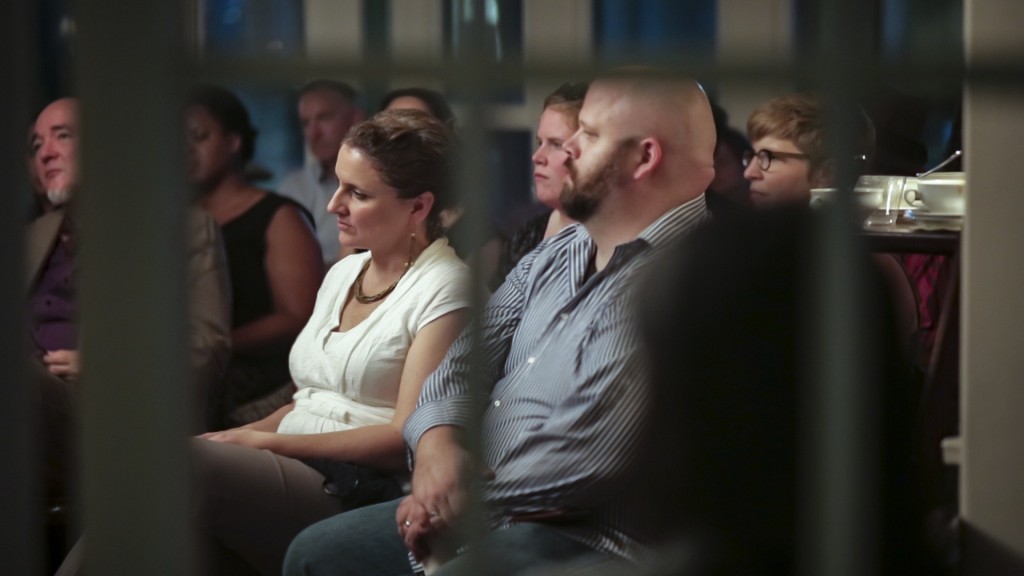
Matt: Can I respond to that? You know one of the challenges I think, when it comes to answering the question is, it’s hard to change an institution that’s writing up your paycheck. Because sometimes we can talk about the radical change that Christ brings into the world.
I remember friends coming through college that said, “We want to be radical change agents in the world.” So now, many years later, I come across many of my friends in ministry and they forgot that conversation. They’d become comfortable with a high-back leather chair. They’d become comfortable with the mahogany board table. They’d become comfortable with the vacations to places that they could have never taken their family before.
Then the question becomes, “I want to change the world, but do I really want to change the world that much? Do I want to be put at risk? Do I want to [confront] the people that are funding this institution?” I pastored a church, and part of the challenge I came up against over and over again was that. You get behind the pulpit and you want to say “I’d rather preach in truth and spirit under a tree than preach in error in a vaulted cathedral.” Well one day you’ll find yourself preaching under a tree. That’s not fun because you don’t have resources to put your kids through school. You don’t have money to put food on the table. Suddenly those pressures, those economic pressures become very real in terms of dictating how you do policy. The challenge that Fuller is going to experience is, how much are we willing not to play it safe to reach an unsafe world?
When we go into South Central, that’s a different audience than what’s here at Fuller.
Lauralee: One of the things that makes it impossible not to take those risks is seeing the image that looks like Big John. Then you know the younger cousins, the younger sisters, the children are coming after you and watching to see what you do.
Sometimes we’re forced into taking the risk, because the alternative is inconceivable to us. My niece is married to a man who is African‑American. We’re very close. They moved from Southern California to Tulsa for a job opportunity. I called them one day and “I said I want to know what’s it like,” and he knew just what I meant. What was it like to be a black man in Tulsa. He said, “it’s all right. What you’d expect more or less.”
He said, “Everyday on the way home from work Lizzy [my niece] calls and says, ‘will you stop at the grocery store and get some milk cause we’re out.’ They have three children.” Every single day on the way home from work. Same grocery store. Soon as he walks in, the security guard follows him up and down every aisle. Whatever he puts in his cart, the guard watches, following a few feet behind him until he’s paid and gone from the store. And he tells me that like, “you know how it is.” And we finished our conversation, me and this beloved young man, a true believer, leader, and godsend to my family. I got off the phone and I cried like a baby.
That’s why I’m going back to this nurturing idea. How does, maybe a better way of saying it is, “how does nurturing take place in an institution?” So that we are encouraged and empowered to take risks.
[Amen!]
One second. Who’s saying amen behind me? Is that you, PJ? OK I want to picture your face. [laughs] Now I’m like listening for her and thinking, oh PJ’s gonna say “Amen” to that. Our own “amen” corner. Don’t hold back.
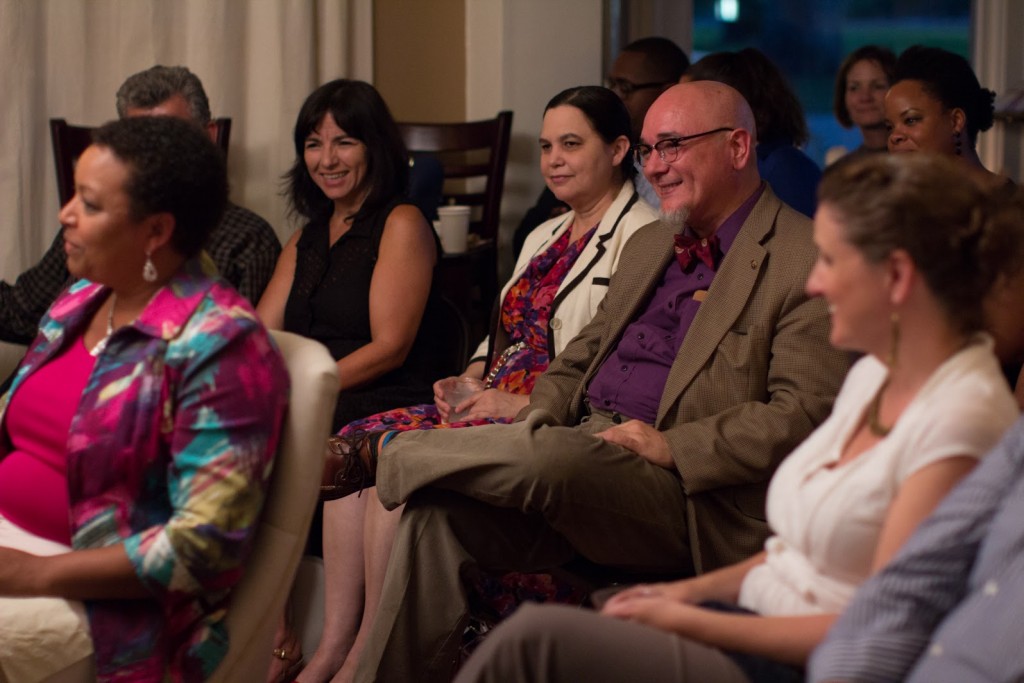
Lauralee: Okay, Love, please speak.
Love: So I’ve been struggling with this notion of nurturing in an institution because the reason I’m on the planet is to try to change the church. It’s why I’m so interested in investing time in master’s students. Because they’re on the front lines of the church.
What happens in my race class, when I teach it once a year in the winter, is real ministry. And I believe that what’s happening little by little is the church is changing. In that space. But there’s something different about this space. The conversations that we are trying to have as a seminary sometimes differ from that classroom, and I’ve been struggling trying out figure out what’s going on. It has to do with “change cannot be microwaved.”
[Amen!]
It has to do with the patient creation of safety in a space where one can share one’s world, and you have to build trust. It’s a slow, step-by-step thing. I am fond of saying in my class that I do not do “soundbites.”
We’re having a summer of “death-by-cop” in the African American community. I cannot tell you how often I get calls: “Could you blog for us or could you do whatever.” I can’t do that. I want to talk about history. I want to unpack some concepts that are thrown around loosely, that are misused, and can be hurtful. I want to walk through the Bible or the New Testament at least, slowly, step-by-step, and think about the text with these problems in mind. I do not do sound‑bites. And that’s what’s been tying my tongue up at this table.
Lauralee: Because you have a brain, you mean? Is that what you’re saying?
[laughter. Amen!]
Love: The other thing that needs to be said, is that the way we go about changing institutions is we’ve got to find a way, to not put extra burden on the vulnerable.
I worked on a paper this summer. I was inspired by my students to do some research on allies and what it takes to think about being an ally from a New Testament perspective. And I brewed on the Gospel of Matthew and it was really illuminating. It’s not just how to teach white people to be allies, I’m also trying to start a conversation about how people of color can be allies to other communities of color.
Lauralee: Can we pause for a second, does everybody want to read that? Is that what everybody’s thinking right now? “How do I get my hands on that?”
[vigorous assent]
Okay. go ahead.
Love: So one of the things we wanna make sure is that we are good allies, right Meggie? Good allies do not put the burden of education on already oppressed groups.
Lauralee: Let’s take a minute here. Imagine that if you were watching this on TV or something, we are gonna pause and Love and I are going to go back and forth a little about this, about who ended up being around this table? And how the people in this room ended up being in this room? Who’s not at this table. Is it obvious? No white males. At the table. That wasn’t intentional originally. Yet it started to shift that direction, so let’s talk for a minute about that now. Let me set a little bit of a stage.
When we were talking about doing the issue on the magazine that we have right now, for a very long time were calling it simply “reconciliation.” Until Love said, “I hate that word.” [to Love] Can I tell this? [assent] She said, “I hate that word.” And I felt a little shocked because I love the word! And, I have to admit, partly because of what it means and partly because graphically it’s clean. It was neat, it’s one word, it’s immediately recognizable, on the spine of the magazine it’s one crisp little word. So I was also being driven by something not all that deep. Imagine that. So Love says, “I hate the word reconciliation.”
That piqued my interest I said, “why do you hate the word?” She said—you correct me if I don’t say this right— “I’m sick and tired of it feeling like that we’re gonna get together and hug it out, and that’s all there is gonna be to it.”
I wish I could tell you how many conversations have taken place around our faculty advisory board, around our office, with trustee Jeff Wright pacing my office, with Bill Pannell dropping by, with Jeanelle coming by and saying, “not that picture, this picture. Not that word, this word. No, how about this word instead.”
Email upon email upon email going back and forth. Though it may seem small, that’s the reason it is called “reconciling race” instead of “reconciliation,” because in those conversations it becomes clear how deep this all goes, just talking about one single word.
So, Love said to me a little while ago, “we don’t want this to be one more occasion where the oppressed are around the table telling their stories.” So, say a little something about that and then let’s push back and forth on each other a little bit.
Love: Yeah, so, this was an invitation. I did not have to show up here right? So, what am I doing here?
[laughter]
And, for that matter, right Meggie, I teach this stuff. So I’m putting myself out there on this all the time. Why is it I have horrible second thoughts, after having said, “Yes, I’m going to do it?” I’m really, I’m struggling with that one. It feels as though I’ve been asked to lead too often in the last couple weeks.
Lauralee: And asked, and asked . . .
PJ: Come on now.
Jeanelle: Yep.
Love: That’s it. And I’m tired.
Jeanelle: Yeah.
Caleb: Yeah.
Clementina: Mm‑hmm.
Matt: Lord help us.
Lauralee: Okay. There it is.
Love: I’m tired.
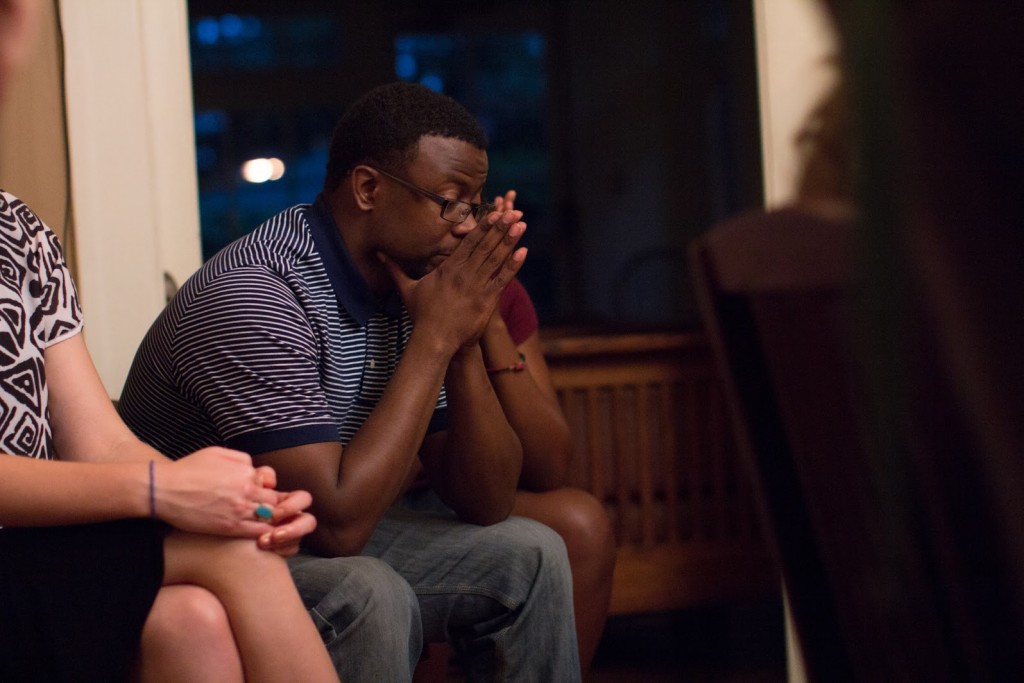
Lauralee: My friend. I see you. And I thank you, for showing up at the table anyway.
Love: I’m trying, I really am.
Lauralee: I know you are. I know you are. And I know that probably some part in you thinks that I’d hunt you down if you pulled out at the last minute anyway. I know that you are one of the few voices, and that you are exhausted.
Jeanelle: Mm‑hmm.
Lauralee: And I have no right to say this, but thank you, on behalf of all those who need you to be a voice. We had this conversation, a little bit of this, and we dove deep into who should be around the table. Even that is of significance. This idea of having the oppressed be the ones who bear the brunt of bringing people into the story is not a new idea to me. It’s incorporated.
Love: Mm‑hmm. It was in your invitation. Right there.
Lauralee: It is also the case that there is a dominant narrative, and there are stories that have not been heard in that dominant narrative. And if we are going to have a table that really ought to be one of a thousand, as I said, and eight among many, many, many stories. That right there is daunting. I don’t have to tell you how many nights before this, not just me, but our whole team have been brewing. [Managing Editor Tamara Johnston] said that she felt like she was going into a recital, that she was nine years old, scared to death, you know. Why? Because we care about this. Because we know it’s inadequate and yet we know it must be done. It must happen, and many more and various conversations like it.
And we know that no matter what happens here, it will feel to some like a request, “Will you exhaust yourself one more time?” And yet without you, just as legitimately it can be asked, “Where is my voice at that table? Why wasn’t my voice heard?
Love: Right.
Lauralee: Right? That is also true?
Love: That’s right. That’s right.
[general assent]
Lauralee: I don’t know if you’re familiar with the film Fiddler on the Roof, but at one point, with great frustration, the main character Tevye says, “This is true, and this is true, and they can’t both be true, but that is also true.” So that’s what this evening is. It’s, yes, you’re right. It is one more time of saying, will you please come and bring your stories, when we have no right to ask for them. I feel that way. And yet, I am so grateful.
The first one we had was on women, and I thought, “If I’m going to have to go through this stinking conversation for the rest of my life, I’m done with it. I don’t need anybody’s permission to tell me whether I have a voice, whether I am a powerful woman or not. Forget that, I don’t care what anybody thinks. I know who I am. I’m 58 years old. I’ve been on this earth for a long time,” not that I have any bitterness about this.
[laughter]
And, have a vision in my mind, of, a very clear vision, of sitting in the cafe at Coffee by the Books at, you know the high tables, the high chairs that look out that big window. And, looking out that window one day when this is going through my mind, “I’m sick of this!” and looking out there was line upon line upon line upon line of young women and men. And I realized, both with frustration and maybe an equal amount of inspiration, I have no choice anymore. It’s too late. Because I can’t look out at that and say, “Forget this and you people with it, I’m not doing this again. I’m not going through the conversation about women and whether we get to exist.” So, sorry, I went off a little on the rails there. There wasn’t any big swearing there, was there, Steve?
Steve: It’s fine.
[laughter]
Lauralee: So, yes, that’s who is at the table: people who have been asked over and over and over again to tell their stories. That’s not overlooked. It’s chosen, to a certain degree. And, I’m sorry that that’s true.
Love: I want to be here, but it’s. . .
Lauralee: [laughs] I want to be here. . . I’m with you.
Love: I, you know, I do. You asked me. I’m like, “Yeah, definitely. Definitely I will.” But, in this last couple of weeks, the constant editing I’m doing in my head: Okay, which story can they handle?
Jude: Yeah.
Clementina: Yeah.
Jeanelle: Mm‑hmm.
Lauralee: You told me that you had a list of safe stories in your pocket . . .
Love: I have a list of safe stories on my phone . . .
Lauralee: That right there, we have to pause on that, just the idea of a list of safe stories . . .
Love: The ones they can handle.
Lauralee: Jeanelle . . . oops. Sorry, I pointed at you again!
Jeanelle: It’s okay, tonight you can point, because it’s a safe space.
[laughter]
[to Lauralee] You said that you feel like you don’t have a right to say “thank you” [to Love], but I feel that I have an obligation to say “thank you.”
Because of you I can be here, and I know that. I sat in those classes and watched people disrespect you, and watched people disrespect other people. And all the others that have gone before. I have an obligation to say “thank you.”
Love: Aw, man, I’m done . . .
Jeanelle: Because I would not be here in this crazy role, Director of Operations of the Pannell Center, if it wasn’t for people like you.
Lauralee: That’s a fact.
Jeanelle: I’m only 30 years old. I’m only 30. And you’ve paved the way, in a seminary where white maleness dominates. And I watch you, and I stand in awe. I’m like, man, that woman carries herself in an amazing way. And I’m like, I wish I could be like her. That’s why I got my hair cut like you!
[explosion of laughter and applause]
Lauralee: There it is right there!
Matt: I can feel good about my haircut.
Love: Yes, you can!
[laughter]
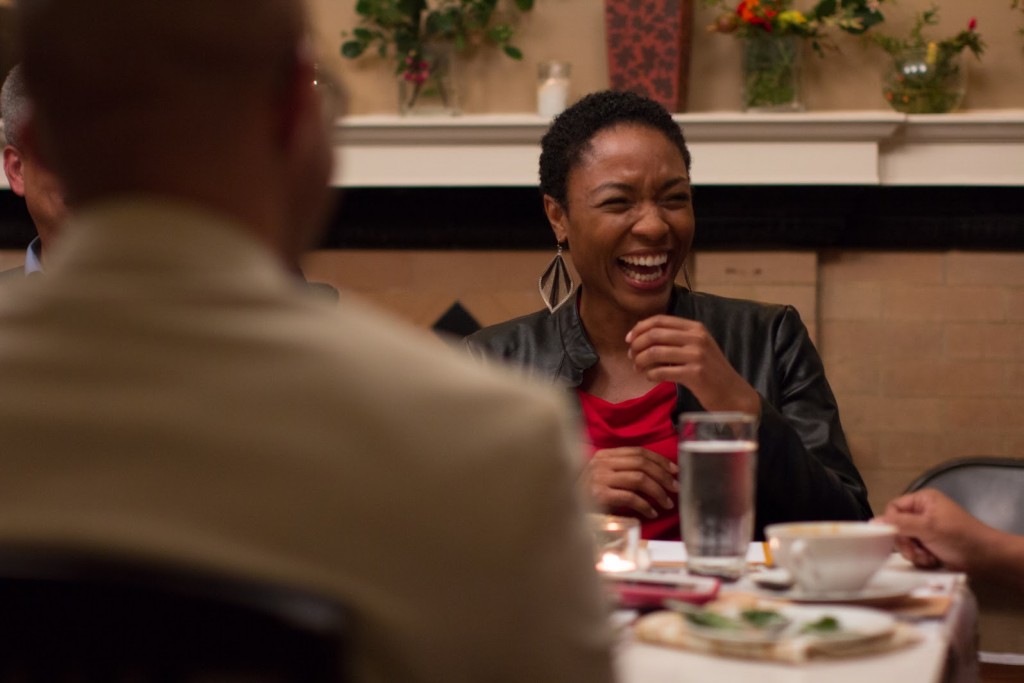
Jeanelle: So, I thank you. I thank you . . .
Lauralee: That’s right.
Jeanelle: . . . because, as we talk about race and reconciling race, I can’t be negligent of the struggles that you’ve gone through so my life can be a little bit easier, and these race conversations can be a little bit more easier for my generation.
Lauralee: Well put, Jeanelle. Good for you.
[pause]
Caleb, I see you over there nodding your head. You probably have 85 things to say right now, don’t you?
Caleb: 95. [laughs]
Lauralee: Choose one. Choose two.
Caleb: I completely second Jeanelle’s remarks. Back to Love, we salute you so much for being the wonder that you are . . .
Love: I am really embarrassed.
[laughter]
Caleb: Really. And professor, it’s a grace that you have given us through your work. And that’s what Jeanelle was saying. We, the younger generation, feel this, this respect for those who have gone before, this reverence for the groundwork and foundations that have been laid that we can maybe be able to build upon. But, we understand the storms and the battles that they had to endure, and they bear the scars and the wounds from those experiences. We know that the bleeding of our Savior was for the benefit of all mankind. And so, there is a time to bleed, and it benefits people.
There’s one particular story that is a bleeding experience for me, but I wanted to share it, that it might help someone. I have a similar story to Jeanelle’s, where, a person I grew up with, their life took a completely different trajectory than mine.
It’s difficult to look back on and think about how we were raised together, same community, same school, same church, same upbringing almost, and what a different course, you know, that our lives took.
One of my best friends growing up was named Charlie, and we were as close as two brothers, and had many of the same experiences coming up. We loved to have slumber parties, as kids, over at each others houses. But, when I went off to college, Charlie didn’t graduate, and he ended up in a life of crime.
And I have, many times, tried to think about how that happened, and what factors were at play. One thing I’ve been able to conclude, is the dynamics of our family—I had my mom and dad there with me and a lot of support, he was raised with an adoptive mother, single-parent family.
The nurturing that you talked about in your family, as I look back, it wasn’t as evident in his family. His mother was, although very loving and raised him well, harshly critical. And we’ll see that, I believe you would agree, with many black mothers in impoverished communities, because they feel that “I have to make sure that my son survives, and it’s so important that I sustain his life. He doesn’t understand how many factors are working against him. I have to be hard on him, especially hard on him.” And that’s the way his mother was. Of course, in love, but yet there was a lot of criticism.
That’s the only difference I can see looking back in our upbringing. But, he ended up choosing criminal activity. And, though we reached out to him and tried to compel him to do otherwise, it was what happened. There but for the grace of God go I.
And, one day, when Charlie was 21, he got with some friends and they decided they were going to do a home burglary in the city of Torrance, in a particular neighborhood that is known for its affluence, known for being predominantly white, and known for an atmosphere of racism.
And so, they broke into this home, but they miscalculated, the owners of the home were there and the police were called. And so, the boys flee, and he runs out into this shed out in the back of the house, and he knew he was going to die. He made several calls on his cellphone to his mother and to family members saying, “I love you. And . . . ”
Lauralee: Oh no . . .
Caleb: . . . this’ll be it. This is it. This is the end.” And, he came out of the shed surrounded by police officers, armed police officers, he was unarmed. And they put 33 bullets in his body.
Love: Oh my God.
Caleb: At the funeral, they couldn’t embalm his body because the body wouldn’t contain the fluid, there were so many bullet holes. There were two things that the family, the community, and us knew at that moment: #1, this was over‑kill; #2, someone, Captain, Sergeant, whomever, in that department decided, “We’re going to make a statement with this kid. We don’t want your kind here.” That was one of my most powerful encounters with racism.
When racism becomes deadly, when it becomes fatal, that’s when it’s at its worst. That impacted me, and I’m sure it will continue to impact me for the rest of my life. Knowing that encounter, and that experience, looking back at all the black boys in my neighborhood and the black boys in my youth group, and the black boys in my family. Knowing that the same threat of death is upon their life, should they make the wrong turn. I have a moral obligation: Everything that I do, whatever successes I have, I have to go back and make sure that they know that there is a better way. There is a way of love. There is a way out. This is what my work and my life is going to be about. There is a sense of nurturing that we have for those that are coming up behind us.
The same way as those before us. Those that nurtured us. We have a responsibility to pour into the next generation. It is a heavy weight and a heavy responsibility.

Lauralee: Thank you for sharing your story, Caleb. Please remember Love’s story of exhaustion—and how much it means to you that she’s willing—when you’re exhausted. There are others who are watching you for the same thing. Those who, if they had the chance to sit at a table they would say, “Thank you for not giving up on me. Thank you for not giving up on those ideas.” I hope this doesn’t seem bizarre, but will you tell a story about Charlie? Tell us something about him and who he was so we can remember him in a different way as well?
Caleb: Charlie was a real jokester. He loved to play pranks. He’d always do different things to make us laugh. He loved to be funny, it was a gift that he had. He could make people laugh. It was always wonderful to have him around. He could have had a career as a professional comedian, he was so funny. I don’t think he saw a better future for himself. He looked around in his community, and he saw the devastation. He saw how people didn’t care. As I said, he was in a single parent family, they struggled a lot financially.
Lack of support. A lot of different things he had to endure. He lost hope in being anything else but. He felt that his options were very restricted and he was very limited. In the time that we had him, he was a blessing to every person he touched with a gift of laughter.
Lauralee: “In the time that we had him.” There’s a hard phrase right there, isn’t it?
Jude: I was remembering a quote from Father Greg Boyle. Father Greg works with a lot of gang kids all over the city now. He said something once, “We have to save some of our grief for the person who died when they pulled the trigger.” He lost his life. There’s this other dying going on all over the place. It’s the opposite of “ubuntu” that we learn from the church in Africa: When one part suffers, we all suffer. We can’t create oppression without dying ourselves. It’s not just that one person is going to get the life sucked out of them. The life gets sucked out of the other, too. It becomes a whole system, how we treat each other.
Lauralee: It goes back to what you were saying about the students in the Centro Latino, Clementina. Why they come back. Why they stay. What they relate to. [pause] Well, you’re all looking at me. Thoughts? Something I said?
Steve: I’m thinking about your question about institutions. You asked if they can be nurtured. At first I thought well, “I hope so.” Then I thought, “No. I don’t think we start there.” I probably should finish this story of my teenage years, because it was pretty grim where I left it. But, in the lost‑ness of that time, and of having everything in my life pulled out from under me, it opened me up to Jesus. My wife’s pretty sure, if I hadn’t moved there, I probably would have been a gang leader.
Moving to Tustin made me nothing, but that made me open to Jesus. I found Jesus in a Presbyterian church there. What I wasn’t aware of at the time, I didn’t know how to name it, was that the white supremacist culture of Tustin was also very present in this church where I met Jesus. But, I loved these people. I still know some of them and they still love me. It has become much more apparent to me over the years of the many ways I was devalued, told I didn’t belong, all the ways that I was excluded. But, affirmed for the ways in which I could behave like them according to their standards.
I learned how to do that. UCLA sociologist Harry Kitano coined a phrase, to describe Japanese‑Americans after World War II. He said, their intent was to “outwhite the whites.” That was my parents’ instructions, so I learned how to do that. I’ve lived and served in white churches and white institutions.
I’ve come to love these places and these people. But, I’m never surprised when the ugliest of the ugly happens. When the most egregious, grotesque racism or violence comes out of these Christian communities that I dearly love. I’m never surprised.
It doesn’t discourage me, though. I have hope for us as Christian churches and institutions, and for Fuller. I have great hope. I also believe that rather than primarily nurture, one of the first things we have to come to terms with is our brokenness. Until we can do that, nurture might simply reinforce the brokenness.
My hope comes from having seen the power of God heal and restore people again and again and again. My current primary place of fellowship with Christians is every Wednesday morning at 7:00 a.m., at an AA meeting in Compton. It is the most powerful experience I have week by week. It’s down the street from the church where I used to pastor. It’s right across the street from a cemetery where I’ve buried people. It’s a treasure of a little place of people who come from all different backgrounds.
Lots of people sharing stories of profound brokenness, and a loss of life to violence and incarceration. And, yet profound hope. And experiencing the grace of God to heal and to reconcile and to restore lives, and within this fellowship, a profound kind of racial – I don’t even want to call it reconciliation – but community, and integrity, and welcome.
I have great hope for institutions, even though institutions may manifest great racism. I still believe God uses those and all of us, with all of our racism. It’s so important for me to help an institution try to see the depths of its depravity. To do it with full hope and love and appreciation and humility that comes from a mutuality in this. I’m not better. We all have different things we see. I want to lend my eyes. I want us to help see our deepest brokenness while never losing hope.
Lauralee: I also feel like that is nurturing. This is nurturing. Even if it’s hard to hear, hard to speak. It’s nurturing on some deep level. But we don’t have to use that word.
Steve: I see what you’re saying.
Lauralee: I want to see. I want to thank you [to Love] for the gift that you gave me earlier. When you said, “I’m having second thoughts. The only reason I’m here is because I trust you.” That right there is golden to me. Golden. It feels like we can do it. We can. We can do it. Yes, to “let’s call out the brokenness.” Yes, “let’s say an institution can be a broken thing.” On the other hand, it’s because an institution exists that this room is here. The lights are on. This table of Victoria’s and the people who work at auxiliary services who helped us move the table here. The plants we may or may not have cut from the landscaping in order to decorate this table and the room around you.
So our time is up. Unless there’s somebody that feels like they can’t leave the table without getting something said. Because we do have time.
Steve: I’m so grateful to be here at this time in my life. I turned 60 a couple years ago. I’m at this point where I feel the freedom to say what needs to be said. I feel like I’m not worried about what someone may think of me, or how this might affect my next career. I’m glad that I can wake up and go to work. There’s that piece of it. I also am old enough now, and have been involved in fellowships long enough where we put our nose right in the fullness of our brokenness, and learn to do it in an unashamed way—because we know we don’t have to be ashamed, we can do it with eagerness, curiosity, and thankfulness for the insight. So, I don’t approach this with any sense of, “Well, I’m old and I’ve got it figured out and I want to help you young ‘uns do this.” We are all fellow screwed-up sojourners, profoundly loved by God, who entrusts this ministry of reconciliation, in biblical terms, to us.
Lauralee: When you say, “Young ‘uns,” you mean like me.
Steve: I do. I looked right at you.
Lauralee: Because 60 something is older than 58.
Steve: Yes. It is.
Lauralee: Let me end with this, and Michael’s going to have a few things to say. Praying at the end, don’t you think we should?
Let me say this. Many have heard me say this before. But this issue of the magazine really took a pound of flesh. It mattered so much, because we were constantly drumming through these issues. Are we saying enough? Do we have enough representation? Are all the voices there? The voices all can’t be in there. Yet, it’s going to be published in this little closed thing, and we’re going to give it out. We’re going to say, “This is Fuller.” Sometimes that became so overwhelming, it became paralyzing.
When we put the magazine out, and Michael shared it on social media. The first response, at least the first response that I saw, was from somebody who said, “Words. Only words.” It was exactly my fear. Exactly. It went straight in. I carried it around.
I thought, “Oh, words. Just words.” True. Also, however, I reminded that phantom person in my mind that words are what we do here. Right? So I don’t want to diminish that response. It went deep because I feel a “yes” to that. All of us feel convicted with our actions and what our faith is without them. Yet, we believe in the power of words. We believe in the power of story. One very specific story in fact that we all share and believe in the power of. The power of the Word. There is power in it. I believe that we can take what has been shared, here at the table, the goodwill and the listening that has happened in the room. Those words can be like a planted garden that we can continue to water.
Caleb, I will remember Charlie. I will. That’s powerful isn’t it? Thank you for that.
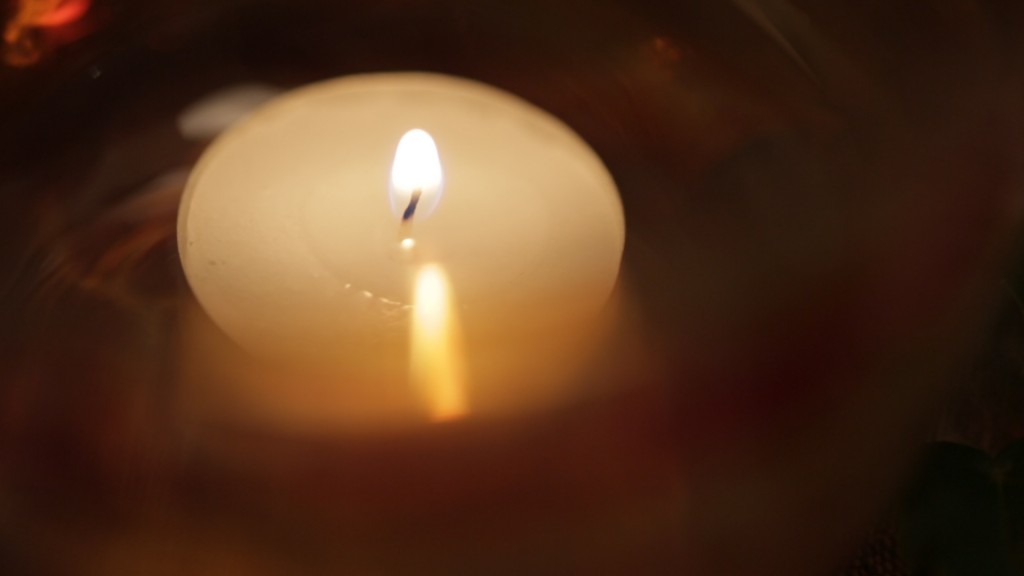
Watch Caleb tell his story
Associate Editor Michael Wright: I am very grateful to be listening. I grew up in an environment where I didn’t know I was racist because I didn’t know people other than white people. My wife Lindsey and I recently moved north of the 210 freeway. The physical anxieties and fears that began to surface affected our relationship.
It surprised me, shocked me. I thought I wasn’t racist. The vulnerability and the passion that you all shared in the presence of all these people, can begin to shift those things a little. It did for me. I felt my heart shift enough that maybe I’ll have enough courage to talk to my neighbors rather than be afraid. On behalf of all the people here, I’m very grateful and honored that you were willing to share the stories that you did tonight.
Lauralee: Let me make a quick note about that, too. [to Mark Labberton] President Labberton has made it clear that he’s deeply committed to continue, as is the rest of the executive office, to continue this discussion. Jeanelle has expressed her desire to continue these conversations. I’ve heard Steve say the same. We want to facilitate that. It’s not the magazine’s job to do that, but we are trying to bring it to life by doing this, bringing words to life. We want to support that in any way we can. But, this conversation needs to go on. That needs to be picked up by the community, too.
John Tiersma Watson: [calling from the audience] I’m used to, in this context, a call and response.
Lauralee: Okay.
John: I heard a call. And if there’s room, I would like to give at least my sense of response. I would like to drag you all into some singing that would go eschatological on us all and get us to where we hope to go. Is that okay?
Lauralee: Please.
John: [singing, call and response] “My people, your people, our people, will be there. My people, your people, our people, will be there! Uphold the God that suffered on the cross of Calvary, he said, ‘I have bought and saved them and they will be free.’
ALL: My people, your people, our people, will be there. My people, your people, our people, will be there.
John: We all shake and shudder, at the darkness in our souls, we have a nail in our hand, and the hammer we do hold. Lord you promised to deliver us, from our own sin. Break us as we contemplate, the cross deep within.
ALL: My people, your people, our people, will be there!
Lauralee: Thank you. That was our prayer. I think we can say, “Amen.”
ALL: Amen.
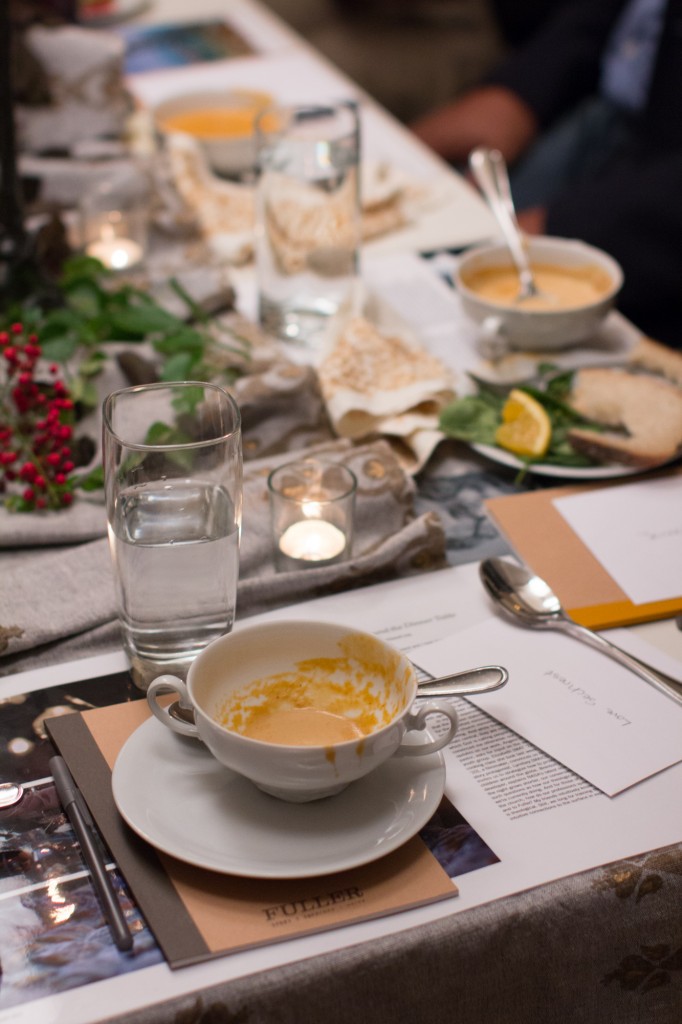
All photography by Nate Harrison and Brandon Hook

+ The Story Table takes a theme from FULLER magazine and brings it to life at everyone’s favorite conversation place: the dinner table. People who embody the theme in unique ways tell their stories around the table, and members of the community are invited to listen in. If you are interested in hosting your own Story Table, we’ve prepared a guide that you might find helpful. Download our Story Table Guide. Explore other Story Tables here.

